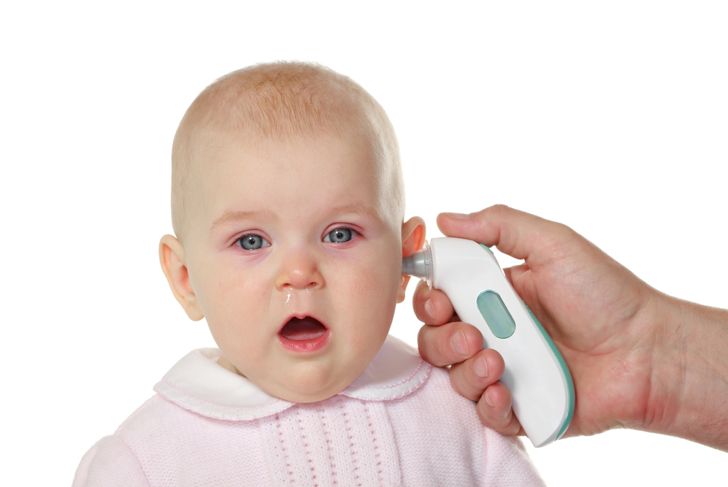Medically referred to as acute otitis media, ear infections are usually caused by bacteria or viruses that affect the middle ear, the air-filled space behind the eardrum where vibrating bones facilitate hearing. Depending on the cause and severity, ear infections may or may not require medical treatment. Ear infections for children should not be taken lightly, however, as prolonged lack of treatment may cause serious complications.
Earache
The most distinctive symptom of an ear infection is mild to moderate pain in the ear. The sensation may be continuous or sporadic, dull and throbbing, or sharp and shooting. Lying down often exacerbates the discomfort, as does pressure on the affected side, such as laying the head on a pillow. Ear infection pain can interrupt sleep, though this is seen more often in children than adults.
Fullness in the Ear
Many people who experience an ear infection develop a feeling of fullness in the affected ear. If the Eustachian tube is blocked, the sensation is comparable to unequal air pressure, such as that felt when descending from high altitudes or coming out of a valley. This fullness can develop when fluids build up inside the middle ear.
Problems with Hearing
Fullness in the ear often impedes hearing, especially when the infection alters air pressure in the middle ear, placing the eardrum under strain. This can interfere with an individual’s hearing ability, making noises seem to echo or sound muffled. Hearing loss due to an ear infection is usually mild but can become worse if the infection goes untreated.
Ringing in the Ear
Sometimes, people with ear infections hear a ringing sound that is not audible to those around them. Often, the sound is described as a long, low-intensity beep or buzz in the infected ear. The symptom may develop unexpectedly and come and go or persist. This is another result of pressure in the middle ear. Treating the infection typically improves this symptom.
Discharge
When an ear infection is severe, the middle ear may become inflamed or fill with fluid. This liquid may leak to the outer ear passage, trickling out as a runny discharge. In most cases, rupturing of the eardrum is responsible for the release of fluid, which can be caused by serious infection or trauma. If blood is also leaking from the ear, this is a clear sign to seek medical attention.
Nausea and Vomiting
Since viruses or bacteria cause most ear infections, the symptoms may extend beyond the ear canal alone. Inner ear infections, rather than common middle ear infections, are more likely to cause nausea, vomiting, and dizziness. Children and individuals with low immunity are the most likely to develop these secondary symptoms.
Fever
Like nausea and vomiting, fever may occur with an ear infection, particularly in children. In most instances, the fever is low grade and devoid of allied symptoms, such as chills. If the temperature rises above 100.4 degrees Fahrenheit, other complications could be impending, and the individual should see a doctor.
Headache
Ear infections can lead to headaches, which are often dull and persistent but may also flare up intermittently. Headaches usually develop due to the inflammation in the ears and the associated pain and fever. Headaches may also be a sign of meningitis or a brain abscess, which are rare but possible complications of an ear infection.
Common Cold-Like Symptoms
The passageways of the ear, nose, and throat are connected, which makes them vulnerable to infection when one contracts a virus or bacteria. Often, untreated or undetected ear infections produce similar symptoms to the common cold, including a runny or stuffed nose, sneezing, coughing, and a sore throat. When the infection is diagnosed and treatment begins, these symptoms should subside.
Miscellaneous Symptoms
Apart from the typical signs or symptoms, ear infections produce less common symptoms in some people. Certain individuals may experience vertigo and a loss of balance. They may have trouble sleeping, become irritable, and lose their appetite. Often, these symptoms are seen in infants and young children or, like other secondary symptoms, people with low immunity.

 Home
Home Health
Health Diet & Nutrition
Diet & Nutrition Living Well
Living Well More
More




















